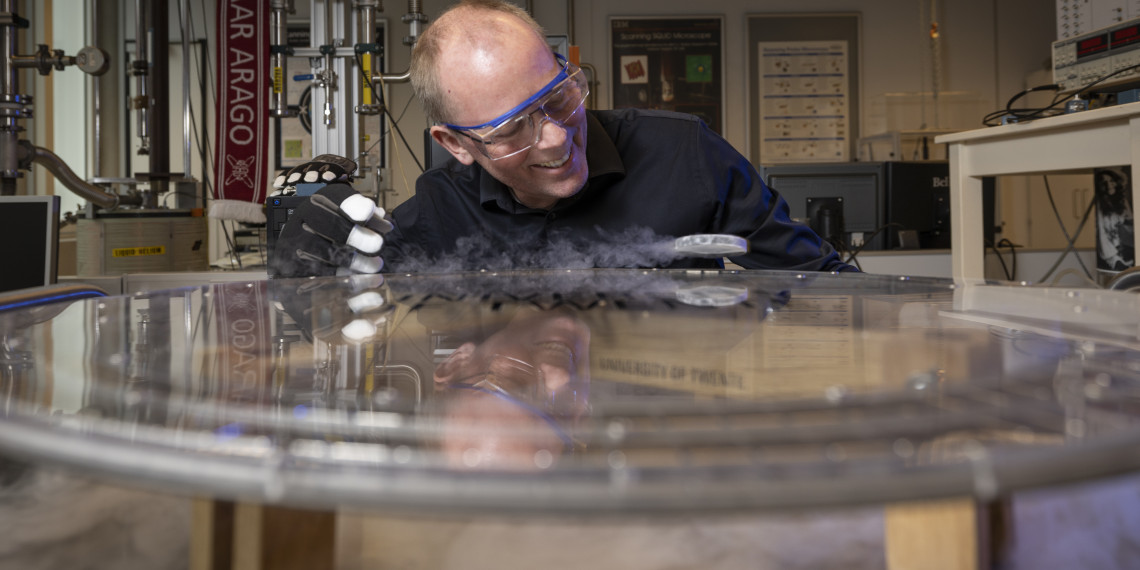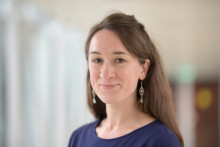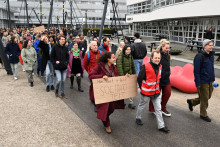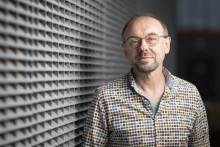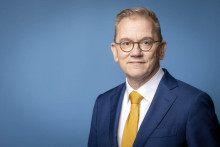As a young student at the THT (future UT) campus, Hans Hilgenkamp certainly didn’t imagine he’d become a successful researcher. ‘If I had a chance to talk to my younger self, he’d be amazed I think,’ says the professor and a former dean. ‘When I was assigned my group - ‘doe-groep’ - at the introduction, I felt that everyone was way smarter than me. Nobody in family studied at a university before, I was the very first. I was a relatively shy boy and I had no exposure to university life before. I certainly didn’t plan to be a scientist. I had to work hard, but I managed to pass the first year in one go. That gave me the confidence that I could do it.’
He might have still been searching for self-assurance, but he never doubted the choice of field – and the choice of his alma mater. ‘I chose to study physics at the THT at the time for two reasons. First of all, I thought of physics as the mother of all sciences, explaining the basics of how nature and the universe works. It was the most fundamental study, but it also had applied aspects which I really enjoyed,’ says Hilgenkamp. ‘Secondly, I come from Zutphen, so not far from here. The THT was seen as this magical centre of everything creative and smart. The idea of a campus as this vibrant environment full of young and smart people was exciting for me.’
Captured by science
Although Hilgenkamp was still planning to find a job in industry after graduation – ‘like at Philips, because that was the thing to do back then’ -, the love for scientific research was slowly creeping in. ‘There were a few highlights during my studies that showed me the joys of science. I went on a study tour organized by the study-association Arago to scientific labs in the USA. Seeing science at work was just fantastic. I also did an internship at the Polish Academy of Sciences in Warsaw in 1989, during the fall of communism. This broadened my horizons a lot, showed me that there was a lot in the world to see. And during my M.Sc. thesis, I realized how much I enjoyed doing research and that I was actually good at it. I was captured by the idea of really doing science.’
Still at the UT, Hans Hilgenkamp therefore made the first step of every future academic: conducting a PhD research. ‘I did my PhD in 1995 on superconducting magnetic sensors. That was a very hot topic at the time. I was still thinking about a career in industry after my PhD, but decided to do doctoral research first because I liked the idea of further investing in myself, to develop myself as a researcher. That is something that comes back as a red line throughout my career. I always try to spend energy on something that helps me and the people I work with grow.’
Then came a post-doc position at the IBM Zurich Research Lab, a couple of years at the University of Augsburg in Germany and, in 2000, a return to Twente. ‘I’ve stayed at the UT ever since, but I always had one foot outside of Twente as well,’ says Hilgenkamp. He took a sabbatical in Australia in 2007, got a visiting professorship position in Singapore and was a part-time professor in Leiden. ‘I’ve always wanted to be active in the rest of the world, not just Twente. I co-founded the Global Young Academy, which has developed into an important worldwide organization. Apart from my scientific work, that is one of the things I’m most proud of in my career.’
'Doing science at world-class level is challenging enough'
An executive or a scientist
When there was an opening for a dean of the Faculty of Science and Technology in 2014, professor Hilgenkamp saw it as a ‘good opportunity to develop new skills, while contributing to the faculty and the university’. ‘It was a very useful and inspiring job. I was always combining it with scientific research and education. For example, we published two papers in Science in those years and I kept giving all my regular lectures. But after four years as dean, I felt that I had to make a choice – I had to choose if I wanted to be an executive or a scientist.’ He chose the latter and, in 2019, returned to research and education full-time. ‘If you want to progress in science, you need to be able to devote sufficient time to it, especially in our funding system that requires a lot of time. So I thought it was a good moment to pass the deanship on to someone else.’
‘I never felt returning to research was a step back,’ adds the professor. ‘It opened up possibilities to start new research lines that I find exciting. That is equally high level. Doing science at world-class level is challenging enough.’
'Being here in Twente was and is a great choice for me'
Brain-inspired computing
Hans Hilgenkamp’s current research focuses on energy efficient computing. ‘When you think of how we want to use computing in the future – smart cars and so on -, you realize that it will start using a big part of our total energy production. It is an urgent technological and societal challenge,’ he says. To help solve it, the scientist is exploring brain-inspired computing. ‘Processes in computers are very 2D – there is a constant information exchange between parts, but data transfer in the brain is much more efficient, because everything is more connected in its 3D structure and memory and processing are more intertwined. Hardware of the brain is constantly developing. Every time you learn something, you change the hardware. Can we mimic that? It should be possible. This is a very exciting topic to work on as a scientist, because you can get inspiration from many different fields and perspectives.’
‘Looking back at my study years… I never imagined I’d be a professor doing this,’ says the alumnus. ‘The university has given me a lot of possibilities to grow. I feel like I owe a lot to the UT in that sense and I want to contribute back. I enjoy helping students. It is really fun to be in an environment with young energy and working with the new generation. I got offers to work elsewhere, of course, but it was not for me. People at the UT are very collegial and open to good ideas. Those willing can get things done here and make a real difference. Being here in Twente was and is a great choice for me.’


